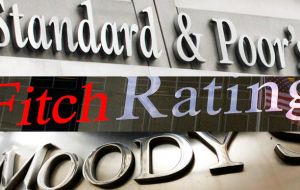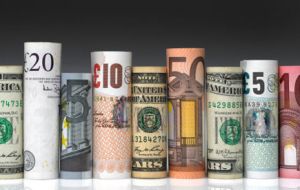MercoPress. South Atlantic News Agency
The 'big three' credit rating agencies questioned by UN for their 'subjectivity'
 UNCTAD argues rating agencies methods are unclear, as the factors considered in the analysis are mentioned but their weight is never specified.
UNCTAD argues rating agencies methods are unclear, as the factors considered in the analysis are mentioned but their weight is never specified.  The reliability of the big three agencies, however, is still under fire for their role in 2008’s financial crisis.
The reliability of the big three agencies, however, is still under fire for their role in 2008’s financial crisis.  But credit rating agencies are still of relevance for the financial sector, despite ”their disastrously inaccurate ratings assessments prior to major crises,”
But credit rating agencies are still of relevance for the financial sector, despite ”their disastrously inaccurate ratings assessments prior to major crises,” Credit ratings agencies have been questioned by the United Nations Conference on Trade and Development (UNCTAD), who says they favor countries with a certain ideological bent.
The so-called “big three” ratings agencies, S&P’s, Moody’s and Fitch, are key to establishing what interest rates sovereign countries and private companies pay for debt issues, as they control 95% of the ratings market and their outlook is used as guidance by investors across the globe.
But according to UNCTAD, their method for doing so is unclear, as the factors considered in the analysis are mentioned but their weight is never specified.
That allows room for a large degree of subjectivity, its yearly Trade and Development Report issued last week argues, and in this case the agencies’ bias is usually “against most kinds of government intervention.”
“There’s a marked ideological bias and that’s a notorious problem for Argentina when you compared the ratings of the last years with those of the 1990s. There have been big downgrades despite clear improvements in debt sustainability figures,” economist Pablo Bortz, who presented the report last week in Buenos Aires, told Noticias Argentinas.
In a study encompassing 51 developing countries, the three major credit ratings agencies’ sovereign debt ratings correlated better with the evaluation that the conservative think tank Heritage Foundation makes on how much those countries respect certain key free-market principles than on how well they are doing on what is usually accepted as key variables for analyzing debt sustainability.
The econometric model “indicates a close linear fit between (the agencies’) ratings and the following variables estimated by the Heritage Foundation: labor freedom, fiscal freedom, business freedom and financial freedom. However, these variables appear to have barely any relation to the countries’ fundamentals, which would determine their ability to service sovereign debt.”
UNCTAD contrasts this with the “much weaker correlation when their ratings are regressed on the four most relevant variables used in the standard macroeconomic literature to asses debt dynamics: the level of the primary budget surplus, the government-debt-to-GDP ratio, economic growth and the current account balance.”
Their statistical analysis also shows that the three agencies ratings strongly correlate with each other, a fact that according to Bortz shows that no real competition is taking place between them. “There is a need for a less concentrated market because the three ratings agencies move in the same direction,” Bortz said.
The reliability of those agencies, however, is still under fire for their role in 2008’s financial crisis.
Multiple analysts said that the fact that those agencies’ were paid by corporate issuers to grade their bonds skewed their perspective in favor of the issuers. If issuers were not offered a positive rating, they could look for a rival agency that would rate their bonds higher, the argument went, creating a climate of unchecked optimism on the quality of those assets that helped inflate the bubble the finally burst in 2008.
Downgrades and upgrades have also been criticized for triggering massive selloffs and buying sprees, which cause sudden shifts in market prices and increase volatility. Recently, Brazil’s economy took a strong turn for the worse after it lost its investment grade from Standard and Poor’s.
“Credit rating agencies are still of relevance for the financial sector, despite their disastrously inaccurate ratings assessments prior to major crises,” UNCTAD’s document stated.
That has led to calls for reform from organisms that include the Organization for Economic Co-operation and Development (OECD), ranging from changing who pays for the ratings agency’s services in order to avoid conflicts of interest to extending public sector involvement in the creation of ratings and forcing banks to return to their old role of assessing credit viability.




Top Comments
Disclaimer & comment rules-

-

-

Read all commentsInstitutions that have a little more representation always in tune actions and values in line with South America.
Oct 13th, 2015 - 09:51 am 0If the world were a single country, the West would be the ISIS.
Always listen to the UN! Don't listen to those biased ratings agencies, their “ideologies” have made their ratings unrepresentative of the real world.
Oct 13th, 2015 - 12:38 pm 0One only has to look with their own eyes and ignore those biased ratings and they will see the real truth of things. The following countries are in reality doing quite well currently and people should invest in them. Nobody knows about them because they are being hidden by those evil ratings agencies. Invest early!
Brazil
Argentina
Venezuela
What a strange situation. Wouldn't we expect a UN report to be presented first to the UN? “Pablo Bortz” sounds like an argie. Does anybody know who or what he is?
Oct 13th, 2015 - 01:25 pm 0Here's a strange statement from him “There’s a marked ideological bias and that’s a notorious problem for Argentina when you compared the ratings of the last years with those of the 1990s. There have been big downgrades despite clear improvements in debt sustainability figures,” economist Pablo Bortz, who presented the report last week in Buenos Aires, told Noticias Argentinas.
Perhaps the credit agencies take into account other factors. Like there's Indec (Illegitimate No_truth Devious Economic Criminals) that just makes figures up according to what the “government” wants. The 10-12 years argieland has spent trying to evade its debts. The lies such as the Kirchner assertion about argieland's level of poverty. Just knock 20% off, why don't you?
Corruption, criminality and murder are the “values” of south america. Particularly brazil.
Commenting for this story is now closed.
If you have a Facebook account, become a fan and comment on our Facebook Page!